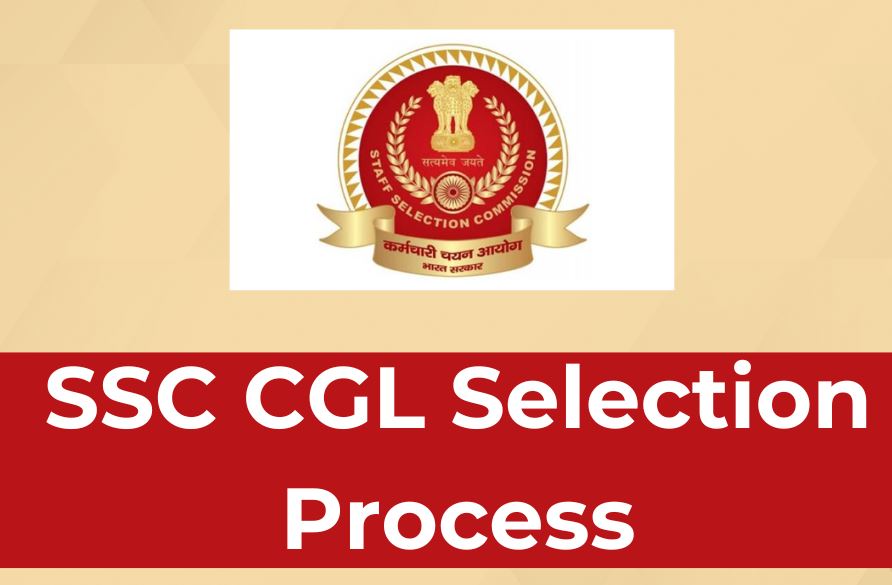The Staff Selection Commission Combined Graduate Level (SSC CGL) examination is a highly competitive exam in India, offering graduates a pathway to prestigious government jobs. For students, especially those new to competitive exams, understanding the SSC CGL selection process is essential to plan effectively and succeed. This detailed guide breaks down the SSC CGL selection process for 2025, with tailored advice for students to navigate each stage confidently, optimized for search engine visibility.
What is SSC CGL?
The SSC CGL exam recruits candidates for Group B and Group C posts in various ministries, departments, and organizations of the Government of India. Popular roles include Assistant Section Officer, Income Tax Inspector, Auditor, and more. With thousands of applicants annually, students need a clear strategy to stand out in this competitive exam.
Why It’s Ideal for Students: SSC CGL is a great opportunity for fresh graduates or final-year students, as it requires only a bachelor’s degree and offers job security, attractive salaries, and career growth.
SSC CGL Selection Process: Detailed Breakdown for Students
The SSC CGL selection process consists of four tiers, each testing different skills. Below is a comprehensive overview of each stage, with specific tips for students to excel.
Tier 1: Computer-Based Examination (Preliminary)
- Mode: Online, objective-type (multiple-choice questions)
- Subjects:
- General Intelligence and Reasoning (25 questions, 50 marks): Tests logical thinking and problem-solving.
- General Awareness (25 questions, 50 marks): Covers current affairs, history, geography, and more.
- Quantitative Aptitude (25 questions, 50 marks): Focuses on mathematics and numerical ability.
- English Comprehension (25 questions, 50 marks): Tests grammar, vocabulary, and reading skills.
- Duration: 60 minutes
- Total Marks: 200
- Purpose: This is a qualifying round. Only candidates who clear the cutoff proceed to Tier 2.
- Key Points for Students:
- Negative Marking: 0.50 marks deducted for each wrong answer, so avoid guessing blindly.
- Language: Questions are in English and Hindi (except English Comprehension), making it accessible for students from diverse backgrounds.
- Preparation Tips:
- Reasoning: Practice puzzles, seating arrangements, and syllogisms. Use books like RS Aggarwal’s “Verbal and Non-Verbal Reasoning.”
- General Awareness: Read newspapers (e.g., The Hindu) and follow monthly current affairs magazines. Focus on the last 6–12 months of events.
- Quantitative Aptitude: Strengthen basics in arithmetic (percentages, ratios, profit-loss) and practice daily using NCERT books or resources like Quantitative Aptitude by RS Aggarwal.
- English: Improve vocabulary with apps like Word Power or read editorials. Practice comprehension and grammar exercises.
- Time Management: Allocate 15–20 minutes per section during practice to build speed and accuracy.
- Resources for Students: Free online platforms like Gradeup, Testbook, or SSC’s official website (ssc.nic.in) offer mock tests and previous year papers.
Tier 2: Computer-Based Examination (Mains)
- Mode: Online, objective-type
- Papers:
- Paper 1: Compulsory for all posts, covering:
- Mathematical Abilities (similar to Tier 1 Quant but advanced).
- Reasoning and General Intelligence.
- General Awareness.
- English Language and Comprehension.
- Computer Knowledge (basic proficiency in MS Office, internet, etc.).
- Paper 2: Statistics (for posts like Junior Statistical Officer).
- Paper 3: General Studies (Finance and Economics) (for posts like Assistant Audit Officer).
- Paper 1: Compulsory for all posts, covering:
- Total Marks: Varies (Paper 1 is typically 450 marks; Papers 2 and 3 are 200 marks each).
- Duration: 2 hours per paper.
- Key Points for Students:
- Negative Marking: 1 mark deducted for wrong answers in Paper 1 (Sections I and II), 0.50 marks in other sections. Be cautious with attempts.
- Depth of Knowledge: Tier 2 is more challenging, requiring in-depth understanding and application of concepts.
- Preparation Tips:
- Mathematical Abilities: Focus on advanced topics like trigonometry, geometry, and data interpretation. Practice with books like “Fast Track Objective Arithmetic” by Arihant.
- English: Practice cloze tests, para-jumbles, and error spotting. Read editorials to enhance comprehension skills.
- Computer Knowledge: Learn basics of MS Word, Excel, PowerPoint, and internet browsing. Free YouTube tutorials are helpful for beginners.
- Statistics (if applicable): Brush up on probability, mean, median, and standard deviation using Class 11–12 NCERT books or “Fundamentals of Statistics” by SC Gupta.
- General Studies (Finance and Economics): Study basic economics (e.g., GDP, fiscal policy) and finance (accounting principles). Refer to Ramesh Singh’s “Indian Economy.”
- Study Schedule: Dedicate 2–3 hours daily per subject. Join online study groups for peer learning and motivation.
- Resources for Students: Use apps like Unacademy or Adda247 for video lectures and affordable courses tailored for SSC CGL.
Tier 3: Descriptive Paper
- Mode: Offline, pen-and-paper
- Format: Essay (200–250 words), letter/application (150–200 words), or precis writing.
- Language: English or Hindi (choose based on your comfort).
- Total Marks: 100
- Duration: 60 minutes
- Purpose: Tests written communication skills, clarity, and coherence.
- Key Points for Students:
- Qualifying in nature (minimum 33% to pass).
- Common topics include social issues (e.g., women empowerment), government schemes, or current events.
- Preparation Tips:
- Essay Writing: Practice essays on trending topics like digital India, climate change, or education reforms. Maintain a clear structure: introduction, body, conclusion.
- Letter Writing: Learn formats for formal (to officials) and informal letters. Practice complaint letters or job applications.
- Precis Writing: Summarize long paragraphs concisely without losing key points. Practice with newspaper articles.
- Handwriting: Ensure legible handwriting, as this is a pen-and-paper test.
- Resources: Use books like “Descriptive English” by SP Bakshi or practice with online sample papers. Join forums on Telegram or Reddit for peer feedback.
- Time Management: Practice writing within 30 minutes for essays and 15–20 minutes for letters to simulate exam conditions.
Tier 4: Skill Test/Data Entry Test (if applicable)
- Posts Requiring Skill Test:
- Computer Proficiency Test (CPT): For posts like Assistant Section Officer in CSS, MEA, and AFHQ. Tests proficiency in MS Word, Excel, and PowerPoint.
- Data Entry Speed Test (DEST): For Tax Assistant posts, requiring 8,000 key depressions per hour (approx. 27–30 words per minute).
- Key Points for Students:
- Both tests are qualifying in nature; no marks are added to the final score.
- Preparation Tips:
- CPT: Practice creating documents in MS Word, spreadsheets in Excel, and slides in PowerPoint. Free tutorials on YouTube or platforms like Coursera can help.
- DEST: Improve typing speed using free tools like TypingClub or Keybr. Focus on accuracy to avoid errors.
- Resources: Use college computer labs or borrow a laptop to practice if you don’t have personal access.
- Time Management: Dedicate 30 minutes daily to typing practice and 1 hour weekly to CPT skills.
- Note: Some posts (e.g., Inspector, Auditor) don’t require Tier 4, so check your post preferences.
Final Merit List and Document Verification
- Merit List: Based on cumulative scores from Tier 1, Tier 2, and Tier 3 (Tier 4 is qualifying). Higher scores in Tier 2 carry significant weight.
- Document Verification: Candidates submit originals of educational certificates, ID proofs, caste certificates (if applicable), and other documents.
- Tips for Students:
- Keep scanned copies of documents ready (degree certificate, 10th/12th marksheets, photo ID, etc.).
- Check post-specific eligibility (e.g., physical standards for Inspector posts).
- Fill post preferences carefully during the application process, as changes aren’t allowed later.
- Post Allocation: Depends on rank, category, and vacancy. Research job profiles (e.g., desk vs. field jobs) to make informed choices.
Tailored Preparation Tips for Students
- Create a Study Plan:
- Divide your day: 2 hours for Quant, 1.5 hours for Reasoning, 1.5 hours for English, 1 hour for General Awareness.
- Reserve weekends for mock tests and revision.
- Leverage College Resources:
- Use library books for NCERTs or reference materials.
- Form study groups with classmates to discuss and solve questions.
- Free and Affordable Resources:
- Download SSC CGL previous year papers from ssc.nic.in.
- Use free apps like Oliveboard or SSC CGL Prep for daily quizzes.
- Follow YouTube channels like Study IQ or Unacademy for free lectures.
- Balance College and Preparation:
- If you’re a final-year student, prioritize time management to juggle college assignments and SSC prep.
- Study during gaps between classes or early mornings.
- Stay Motivated:
- Set small goals (e.g., complete 50 Quant questions daily).
- Join online communities (e.g., SSC aspirants’ groups on X or Telegram) for inspiration and updates.
- Health and Stress Management:
- Take short breaks every 1–2 hours to avoid burnout.
- Practice mindfulness or light exercise to stay focused.
Why SSC CGL is Perfect for Students
- Early Career Start: Fresh graduates can secure high-paying government jobs without work experience.
- Diverse Opportunities: Choose from desk jobs (e.g., Auditor) or field roles (e.g., Excise Inspector) based on your preference.
- Job Security: Government jobs offer stability, pensions, and benefits, ideal for long-term career planning.
- No Experience Required: Unlike many private-sector jobs, SSC CGL only requires a degree, making it accessible for students.
Common Challenges for Students and How to Overcome Them
- Challenge: Limited exam experience.
- Solution: Take free online mock tests to familiarize yourself with the exam pattern.
- Challenge: Weak basics in Quant or English.
- Solution: Start with Class 9–10 NCERT books for Quant and Wren & Martin for English grammar.
- Challenge: Staying updated with current affairs.
- Solution: Use apps like Inshorts or follow X accounts posting daily current affairs updates.
- Challenge: Financial constraints for coaching.
- Solution: Rely on free YouTube channels, affordable apps, or borrow books from libraries.

Hi, I’m Varun Pathak, the founder of TheSarkariNaukri.com—a dedicated platform for the latest updates on government jobs (Sarkari Naukri) in India. With years of experience curating reliable information on job vacancies, admit cards, exam results, and preparation strategies, I help thousands of aspirants navigate the competitive world of public sector opportunities. Passionate about job security, career growth, and empowering freshers for roles like IAS, IPS, and PSU positions, I update the site regularly with actionable insights for 2025 and beyond. Let’s connect to turn your career dreams into reality!
